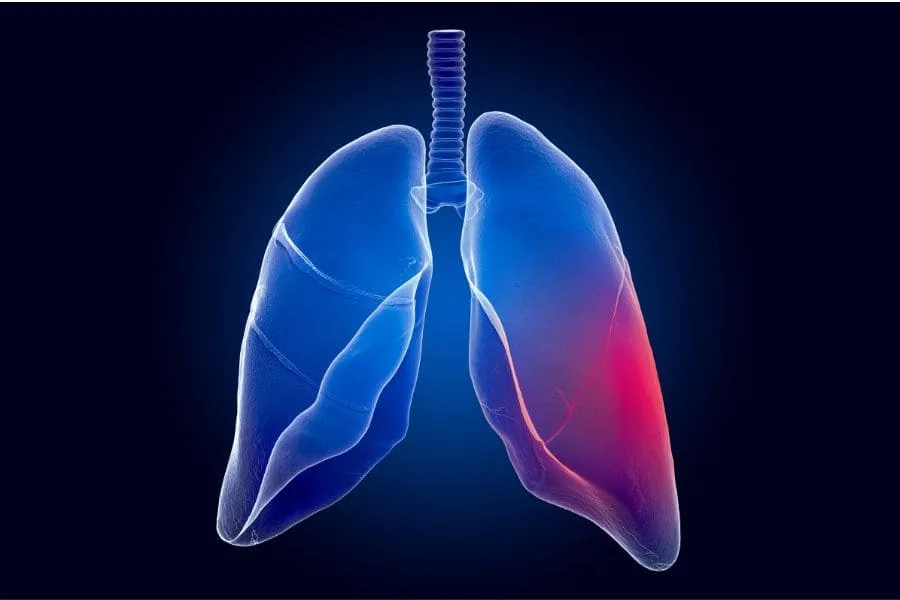Lung pain is a physical symptom that can have various medical causes, but it’s often explored within spiritual contexts as well.
Many traditions and belief systems propose that physical ailments, such as pain in the lungs, may be manifestations of unresolved emotional or spiritual issues.
It’s a concept that finds its roots in holistic approaches to health which consider the interconnectedness of mind, body, and spirit.
Within these spiritual perspectives, lung pain might represent a multitude of emotional states.
Common among these is the belief that such pain correlates with grief, loss, or sadness.
The notion is that the lungs, associated with the breath of life, signify one’s capacity to take in life fully.
When there is pain, it may be interpreted as a sign of constricted life energy due to emotional blockages or unprocessed traumas.
These interpretations are not meant to replace medical advice or treatment but rather serve as a complementary lens through which some individuals may choose to explore the deeper meanings of their physical experiences.
For those inclined towards spiritual reflection, investigating the symbolic significance of lung pain can be a pathway to self-awareness and emotional healing.
Spiritual Meaning of Lung Pain

1) Emotional Grief
Lung pain is sometimes perceived in various spiritual traditions as a manifestation of emotional grief.
They propose that deep sorrow and loss, if unresolved, may be energetically stored within the body, manifesting as physical discomfort in the lungs.
It is in these beliefs that the lungs carry the weight of emotional bereavement.
2) Unexpressed Sadness
In spiritual contexts, lung pain may be seen as the physical counterpart to unexpressed sadness or depression.
Such traditions suggest the importance of addressing and expressing these emotional states to prevent them from impacting one’s physical health.
Read too: Chest Pain Spiritual Meaning (Understanding The Connection)
3) Anxiety and Stress
Anxiety and stress may have spiritual implications related to lung pain.
Some beliefs hold that these emotional states affect the flow of energy within the body, potentially leading to discomfort or pain in areas like the lungs, which are associated with life force and breath.
4) Detoxification
From a spiritual viewpoint, lung pain might indicate the need for a detoxification process, not only physically but also emotionally and spiritually.
Exposure to negative or corrupting influences may, according to some beliefs, necessitate a purification to restore balance.
5) Blocked Energy
Certain spiritual views associate lung pain with blocked energy, particularly within the chakras.
The Heart chakra, located near the lungs, is often associated with love and emotions. Pain may signal an imbalance or blockage in this center.
6) Heart Chakra Connection
Lung pain is also linked to the Heart chakra’s health in various spiritual traditions.
When this chakra is out of alignment, one might experience pain manifesting in the chest area, prompting a reevaluation of emotional well-being.
7) Spiritual Awakening
In some spiritual circles, lung pain could be considered a sign of an awakening or the surfacing of deeper issues that need attention.
It is a call to introspect and heal unresolved spiritual matters that might be affecting one’s emotional or physical state.
Cultural Interpretations of Lung Pain
Lung pain holds various meanings across different cultures, often linked to emotional states and spiritual beliefs.
These interpretations provide insight into how emotional and psychological factors are believed to manifest physically.
Eastern Philosophies
In Eastern traditions, the lungs are frequently associated with grief and sadness.
Chinese medicine, for example, considers the lungs to be central to the regulation of Qi, the vital life force.
Imbalances in lung Qi are often linked to melancholy and sorrow. Practices like qigong and tai chi aim to balance Qi and may be used to address such imbalances.
Western Symbolism
In Western symbolism, lung pain can also be connected to emotional distress. A common interpretation is that lung-related issues symbolize difficulties with receiving love and life, as breathing is intimately connected to feeling alive and loved.
Within some psycho-spiritual frameworks, it’s believed that lung issues may reflect a fear of letting go or a resistance to change.
Psychological Perspectives on Pain
Psychological factors play a crucial role in how an individual experiences and interprets pain, including lung pain.
Understanding these psychological perspectives is pivotal in managing discomfort effectively.
Cognitive Interpretation: Pain is not merely a sensation but also a cognitive interpretation.
The brain assesses signals from the body and determines their significance. If lung pain is interpreted as a threat, the individual may experience heightened levels of distress.
Emotional Response: Emotional states have a significant impact on pain perception.
Anxiety, depression, or stress can amplify pain, while positive emotions might act as natural analgesics, reducing the pain’s intensity.
- Stress and Coping Mechanisms:
- Stress can exacerbate pain symptoms.
- Learning effective coping strategies, such as mindfulness or relaxation techniques, may alleviate the perceived severity of lung pain.
Cultural Context: Cultural beliefs influence the understanding and expression of pain.
In some cultures, enduring pain without complaint is valued, potentially altering the individual’s willingness to seek help or acknowledge suffering.
Social Support: A person’s social environment can affect their pain experience. Supportive relationships may provide emotional comfort, reducing feelings of isolation and anxiety associated with pain.
If you are enjoying reading this, you will definitely enjoy reading Ear Infection Spiritual Meaning (Is It Good?)
| Factor | Impact on Pain Experience |
|---|---|
| Cognitive Interpretation | Modulates perception of threat |
| Emotional State | Correlates with pain intensity |
| Cultural Beliefs | Shapes pain expression |
| Social Support | Influences emotional well-being |
In application, therapists may integrate these psychological facets to create comprehensive pain management plans, acknowledging that the mind and body are intricately connected in the pain experience.
Spiritual Practices for Managing Lung Pain

Those experiencing lung pain may consider supplementing their medical treatment with spiritual practices.
These methods focus on the connection between the mind and the body to help alleviate discomfort.
Breathwork and Meditation
Breathwork and meditation are foundational practices that promote relaxation and can ease lung pain by reducing stress-related constriction.
-
Guided Breathing:
Method: Follow a structured breathing pattern.
Purpose: To steady the breath, often leading to a calming effect on both the mind and the lungs. -
Mindfulness Meditation:
Method: Observe breath flow naturally, without alteration.
Purpose: To foster awareness and present-moment focus, potentially decreasing the impact of pain.
Energy Healing Techniques
Energy healing, which includes practices such as Reiki or qigong, can also be beneficial for those with lung pain.
-
Reiki:
Method: A Reiki practitioner directs universal energy to the individual to promote healing.
Purpose: To balance energy in the body, which may support healing processes. -
Qigong:
Method: Combine gentle movements with breathing exercises and meditation.
Purpose: To enhance life energy, known as “qi,” potentially supporting lung function and pain relief.
Integrative Approaches to Pain

Integrative approaches to pain consider the multidimensional experience of pain, which includes biological, psychological, social, and spiritual elements.
These approaches aim to treat the whole person rather than just the symptoms of pain.
Considering lung pain within this context might involve an exploration of emotional and spiritual well-being alongside conventional medical treatment.
- Biological: Conventional medicine and understanding the physiological roots of pain.
- Psychological: Behavioral therapy to manage the emotional impact of pain.
- Social: Support systems and community care.
- Spiritual: Addressing existential concerns and finding meaning.
For example, an integrative strategy may include:
- Physical Therapies: Such as medication, physical therapy, or acupuncture.
- Counseling: For emotional support and to develop coping strategies.
- Support Groups: Facilitating social connections that provide shared experiences and compassion.
- Spiritual Guidance: Exploring the spiritual dimensions of pain, which might include meditative practices or pastoral care.
Healthcare providers who adopt an integrative approach often collaborate with a range of professionals including physicians, therapists, counselors, and spiritual care providers.
They aim to create a personalized care plan that acknowledges the complex nature of pain and its effects on an individual’s life.
Engaging with patients through a holistic lens has the potential to improve not only physical outcomes but also their overall quality of life and well-being.
Before you leave, read Why Can’t I Sleep? Spiritual Meaning And Solutions
Final Words
In the exploration of lung pain and its potential spiritual implications, it is important to recognize the diverse interpretations that exist.
Spiritual significance is often attached to physical ailments, and lung pain is no exception.
- For some, it may symbolize emotional grief or loss.
- Others might see it as an indication of communication issues or a reflection of internal conflict.
The belief in a connection between the physical and the spiritual suggests that lung pain could be a signal to pay attention to one’s emotional and spiritual well-being.
Addressing unresolved feelings or expressing oneself might be seen as steps towards healing.
Here is a brief summary of potential spiritual meanings attributed to lung pain:
- Grief or loss
- Silent internal conflict
- Disruption in energetic flow
- Communication troubles
- Sign of a soul’s signal or awakening
Remember, these interpretations are inherently subjective and should not replace professional medical advice.
They offer an alternative perspective that some find valuable in their personal and spiritual journey. Always consider the advice of healthcare professionals for physical symptoms.








